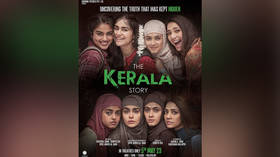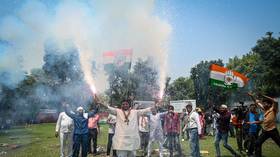Movie about Indian women’s exodus to Islamic State sparks discord

A new Hindi film ‘The Kerala Story’ has stirred massive controversy in India and has triggered a political war of words.
Little-known director Sudipto Sen’s film – set in the southernmost Indian state of Kerala – has touched a raw nerve among the political class and a section of the general public. The film narrates the tale of 32,000 Hindu and Christian women, who were allegedly enticed into joining the ranks of the terrorist organization Islamic State (IS) in the Middle East.
On Fridray, the country’s Supreme Court sought to know the rationale behind the movie having been banned in the eastern Indian state of West Bengal, which is ruled by a regional party called the Trinamool Congress, when the film is being shown across the nation without any problem.
“Why should West Bengal ban the movie? It is running in the rest of the country including in states having similar demographic composition and nothing has happened. This has nothing to do with the artistic value of the film,” observed a bench of Chief Justice Dhananjaya Yeshwant Chandrachud and Justice Pamidighantam Sri Narasimha. The Supreme Court bench issued notices to West Bengal and also to the southern Indian state of Tamil Nadu.
Although the Tamil Nadu government, which is ruled by another regional opposition party, Dravida Munnetra Kazhagam, has yet to ban the film, cinema owners have decided not to screen it over alleged law-and-order concerns. Earlier, India’s opposition parties slammed the “propagandist” film, which was released on May 5, for “distortion” of facts in a bid to destroy religious harmony in the world’s most populous nation’s ahead of next year’s crucial parliamentary elections.
However, the movie has received support from India’s Prime Minister Narendra Modi, who has said the film “exposes the consequences of terrorism in a society.”
His Cabinet colleague and federal minister for Information & Broadcasting, Anurag Thakur, has echoed the prime minister. BJP supporters have hosted free screenings of the film and also made it tax-free in some states, such as Uttar Pradesh, Madhya Pradesh and Gujarat, where the Hindu party is in power.
The film’s release coincided with the election campaign in Karnataka – the only southern state where the BJP was in power at the time. However, the opposition Indian National Congress has since soundly defeated the BJP and taken over the state’s Legislative Assembly.
The film has garnered poor reviews, but this has not deterred masses from making a beeline for cinemas, as the impressive box-office receipts show. ‘The Kerala Story’ has evoked comparisons with ‘The Kashmir Files’, a film released last year that portrayed the exodus of Hindus from Muslim-majority Kashmir in the early 1990s. Although both films are lacking in star-studded casts, which most Bollywood films try to cash in on, and were largely panned by critics, both received praise from Modi and his BJP colleagues.
India’s leading fact-checking website, Alt News, has called out the film for its factual inaccuracies, such as the alleged number of women – 32,000 – who left the state, as depicted in the film’s promo ahead of the release. Sen, the filmmaker, has defended the film and hit out at the critics, claiming that the plot was based on true events and is the result of several years of painstaking research.
The raging controversy is at odds with Kerala’s image as one of India’s most progressive states and the only one to be ruled by a Communist government. It is also known for its religious harmony – data from the last census conducted in 2011 shows Kerala, with a total population of 33 million, has 55%, 27%, and 18% Hindus, Muslims and Christians, respectively.













